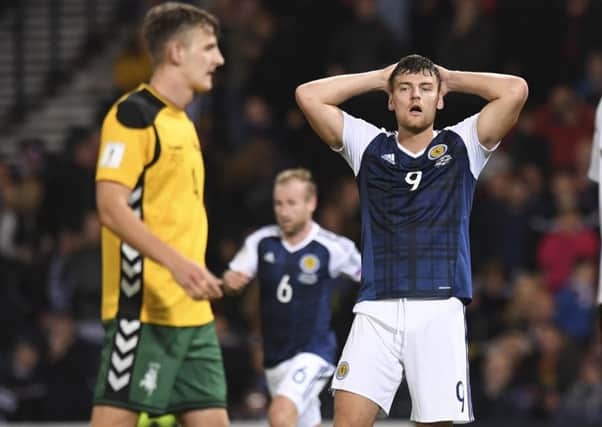Gordon Strachan defends his team selection in Lithuania draw


So, in the aftermath of Saturday night’s 1-1 draw against Lithuania at Hampden, it is probably beneficial to Gordon Strachan that he pays little heed and certainly has scant regard for those lining up to criticise him.
Strachan has always been comfortable and resolute in feeling he is under no obligation to give credence to those views expressed by pundits and punters alike. Setting aside the irony of his regular employment as a TV analyst of other teams, Strachan’s single- minded and self-assured approach to his work can clearly be a valuable defensive mechanism in difficult times.
Advertisement
Hide AdAdvertisement
Hide AdAhead of tomorrow night’s World Cup qualifier against Slovakia in Trnava, he finds himself under perhaps the most intense scrutiny he has yet faced during his near four-year tenure in charge of the national team. But if Strachan is feeling the heat, he disguised it well during a Sunday lunchtime media briefing where he patiently addressed some of the issues which had generated the most negative feedback to the result and performance against Lithuania.
His choice of Chris Martin as the central striker, ahead of either Leigh Griffiths or Steven Fletcher, and his substitution of £13 million winger Oliver Burke in the second half appeared to cause most angst among the Tartan Army.
Strachan maintained a robust defence of Martin’s contribution and has also warned against placing too much expectation on the shoulders of Burke at this stage of his fledgling international career.
“Chris doesn’t have to be [the focal point] of the way we play, but for the games so far in the group we thought he would be of benefit,” said Strachan.
“We won our first game 5-1 in Malta, where he scored, then he led the line terrifically well on Saturday night and went close a couple of times.
“If you actually analyse what he did, he did very well. The main thing is the other players and the coaching staff thought he did very well.
“I’ve spoken before about main strikers being big and strong these days. There is one of them in nearly every team. The trend I saw in the Euro 2016 finals was a bigger striker playing up front for most countries. They don’t have to be the quickest, they just have to bring other people into play.
“So that was the idea, but we have other options. Steven Fletcher can do a similar job, Leigh Griffiths is a wee bit different and we also have Steven Naismith who can play up front as well. You pick the one you think is going to be right on the night.
Advertisement
Hide AdAdvertisement
Hide Ad“Our tactics on Saturday were not that much different to how we played in Malta. We maybe just moved one or two people into different positions. But the idea was the same – to try to get it, play and be brave on the ball.”
On the potentially unrealistic anticipation of what 19-year-old RB Leipzig player Burke can bring to the Scotland side, Strachan feels the pressure being placed on him might be excessive. “Maybe there is too much,” he said. “We have to look at that with him. But we just think there were a couple of things we saw from him, that it livens up for us when he takes off and does the things he can. We knew Lithuania would be sticky at the start of the game, so if he could go and eliminate people with his strength and pace, we were happy with that.”
Whatever other deficiencies may be exposed in Strachan’s squad as Group F unfolds, he remains fully content with their levels of mental resilience during the periods of games when things threaten to go pear-shaped.
“Listen, there were guys we would probably expect to play a wee bit better for us on Saturday,” he said. “But what has happened so far is that in Malta in the first game, when it went back to 1-1, we all go ‘Oooh, this could be the one…’, but the players dealt with it.
“It went to 1-0 for Lithuania on Saturday, and everybody goes ‘Ah, here we go…’. But the players came back again. We got the equaliser and in the last 15 minutes we had enough chances to win the game.
“So questions have been asked about our technical ability at times. But you can’t ask anything about those two situations so far when you think, ‘Oh, this could be a sticky moment’. The players got themselves out of it by being brave.”